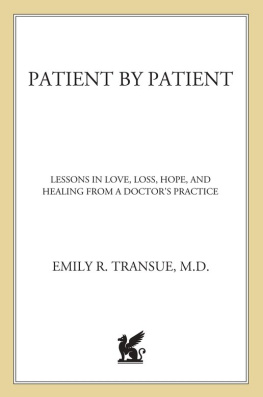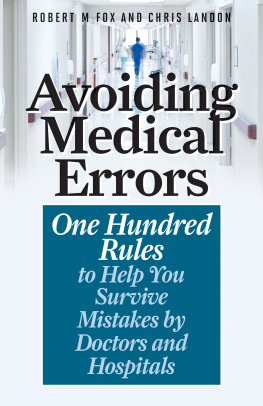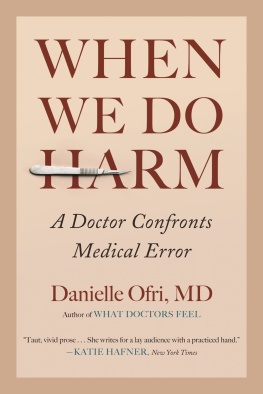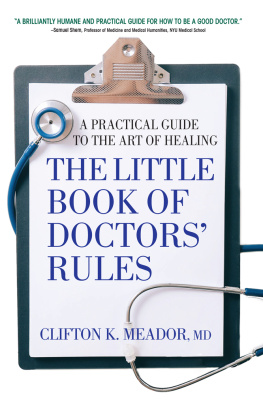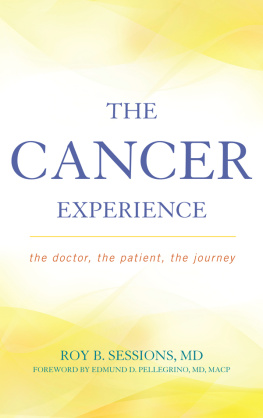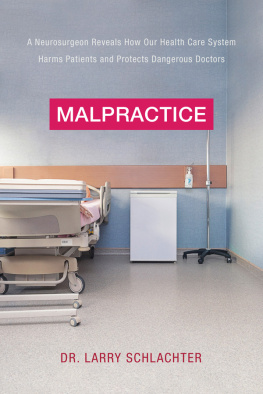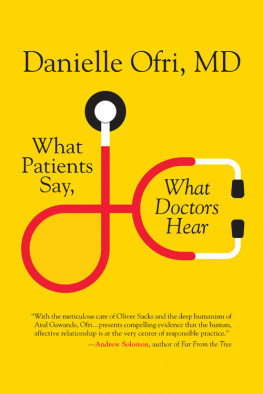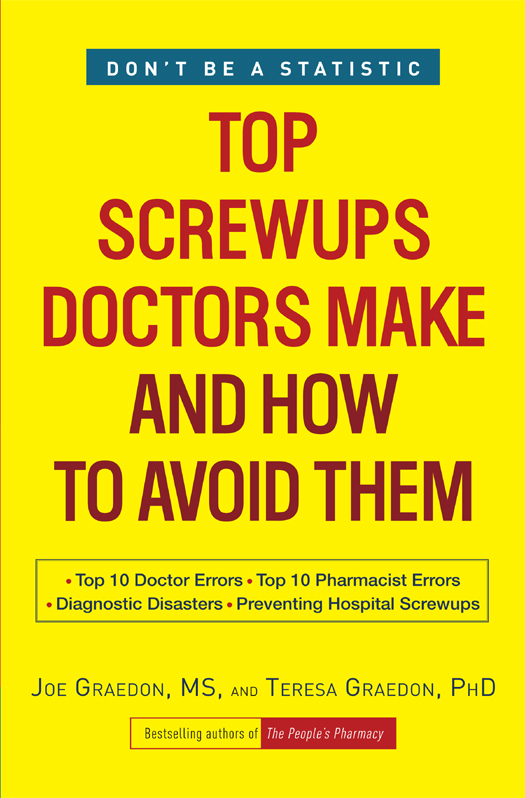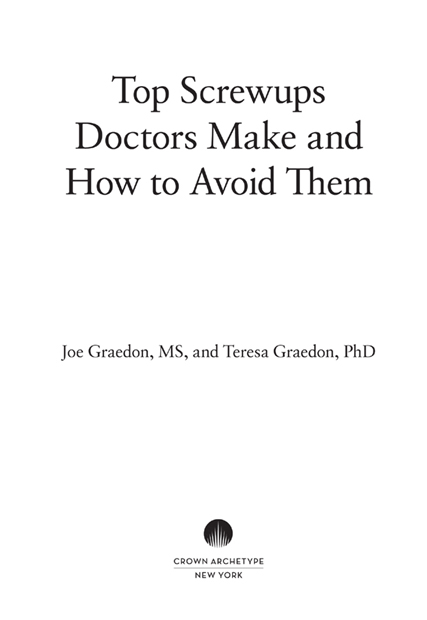ALSO BY JOE AND TERESA GRAEDON
The Peoples Pharmacy-2 (Avon, 1980)
Joe Graedons The New Peoples Pharmacy:
Drug Breakthroughs of the 80s (Bantam, 1985)
The Peoples Pharmacy, Totally New and Revised
(St. Martins Press, 1985)
50+: The Graedons Peoples Pharmacy for Older Adults
(Bantam, 1988)
Graedons Best Medicine: From Herbal Remedies to High-Tech
Rx Breakthroughs (Bantam, 1991)
The Aspirin Handbook: A Users Guide to the Breakthrough Drug of the 90s
(Bantam, 1993) with Tom Ferguson, MD
The Peoples Guide to Deadly Drug Interactions:
How to Protect Yourself from Life-Threatening Drug/Drug, Drug/Food,
Drug/Vitamin Combinations (St. Martins Press, 1995)
The Peoples Pharmacy, Completely New and Revised
(St. Martins Press, 1996, 1998)
Dangerous Drug Interactions: How to Protect Yourself from Harmful Drug/Drug,
Drug/Food, Drug/Vitamin Combinations (St. Martins Press, 1999)
The Peoples Pharmacy Guide to Home and Herbal Remedies
(St. Martins Press, 1999)
Best Choices from The Peoples Pharmacy (Rodale, 2006, 2007)
The Peoples Pharmacy Quick & Handy Home Remedies
(National Geographic, 2011)
ALSO BY JOE GRAEDON
The Peoples Pharmacy: A Guide to Prescription Drugs, Home Remedies, and Over-the-Counter Medications (St. Martins Press, 1976)
No Deadly Drug (Pocket Books, 1992),
a novel by Joe Graedon and Tom Ferguson, MD
ALSO BY TERESA GRAEDON
Chocolate Without Guilt (Graedon Enterprises, 2002),
a cookbook by Terry Graedon and Kit Gruelle
Copyright 2011 by Graedon Enterprises, Inc.
All rights reserved.
Published in the United States by Crown Archetype, an imprint of the Crown Publishing Group, a division of Random House, Inc., New York.
www.crownpublishing.com
CROWN ARCHETYPE with colophon is a trademark of Random House, Inc.
Library of Congress Cataloging-in-Publication Data
Graedon, Joe.
Top screwups doctors make and how to avoid them /
Joe Graedon & Teresa Graedon.1st ed.
p. cm.
1. Medical errors. I. Graedon, Teresa, 1947 II. Title.
R729.8.G73 2011
610.289dc23 2011016332
eISBN: 978-0-307-46093-6
Jacket design by Nupoor Gordon
v3.1
This Book Is Dedicated to
the Memory of Helen Graedon
Who lived her life with courage, compassion, enthusiasm,
and perseverance. Her love and support nourished us over the decades.
We hope this book will mean that her tragic death was not in vain.
and
To health care providers who strive to offer patients safe, effective, and compassionate care.
Contents
Acknowledgments
The patient safety movement has taken root. There are now many physicians, nurses, pharmacists, and other health care providers working diligently to improve the current disastrous situation. There is a great deal of work to be done, but these pioneering souls are leading the way through their research, outreach, and direct interaction with patients.
It isnt possible to list all the people who have in some way contributed to our understanding of the scope of the problem and the steps needed for improvement. Here are just some of the individuals who have helped make this book possible directly or indirectly. We also want to acknowledge all the patients and family members who have contributed their stories through our newspaper column, radio show, and website.
Jerry Avorn, MD, is one of the countrys leading experts in drug safety. His innovative research has helped us understand some of the pitfalls in clinical trials. We are especially grateful for his attention to the problems that drugs can pose for older people.
David Bates, MD, is one of the pioneers in the patient safety movement. We are grateful for his research and his efforts to move his colleagues forward.
Steven Feldman, MD, PhD, is a dermatologist who has thought long and hard about the issues of communication between physicians and patients and the ways it can go awry. We recommend his book Compartments: How the Brightest, Best Trained, and Most Caring People Can Make Judgments That Are Completely and Utterly Wrong.
Karen Frush, MD, is chief patient safety officer for the Duke University Health System and is one of many Duke physicians working hard to make the institution a safer place. We are grateful for her efforts.
Curt Furberg, MD, PhD, is an outspoken advocate for drug safety. His integrity and dedication make him one of our heroes.
Nortin Hadler, MD, is one of the smartest analysts of medical practice that we know. He opened our eyes to the many ways statistics can be used to mislead physicians and patients alike. We highly recommend his book Worried Sick: A Prescription for Health in an Overtreated America.
Heather Jackson is an editor who has led us hither and yon and who immediately understood the importance of this book. We are extremely grateful for the opportunity that she created.
Sydny Miner is a marvelous editor who picked up where Heather Jackson left off and helped us to move this project forward with great insight and skill.
Thomas Moore is senior research scientist at the Institute for Safe Medication Practices. His success at cracking the code for the Food and Drug Administrations Adverse Event Reporting System and his passion for discussing drug safety have contributed greatly to our thinking.
Robert Muder, MD, is a professor of medicine at the University of Pittsburgh in the Division of Infectious Diseases and the chief of the Infectious Disease Section at the Veterans Affairs Pittsburgh Healthcare System. He helped us understand how patients can be protected from health careacquired infections.
David Newman-Toker, MD, PhD, is a neurologist and colleague with Peter Pronovost at the Johns Hopkins University School of Medicine. His landmark paper (with Peter Pronovost) in the Journal of the American Medical Association (Diagnostic ErrorsThe Next Frontier for Patient Safety) opened our eyes to one of the top screwups in medicine today. Dr. Newman-Tokers groundbreaking research in developing a fast, inexpensive strategy for diagnosing strokes (Stroke, November 2009) is the kind of innovative thinking we admire.
Art Papier, MD, is an innovative dermatologist who, with his colleague Lowell Goldsmith, MD, came up with a brilliant way to help health care providers and patients diagnose skin problems. Dr. Papier provided the spark that lit the fire that illuminated this book.
Peter Pronovost, MD, PhD, is our hero. He has made patient safety a cornerstone of his career and is renowned for his innovative work developing the checklist concept for medicine. Dr. Pronovost speaks truth to power. He is a professor at the Johns Hopkins University School of Medicine, where he directs the Quality and Safety Research Group and serves as the medical director of the Center for Innovation in Quality Care. We highly recommend his book Safe Patients, Smart Hospitals: How One Doctors Checklist Can Help Change Health Care from the Inside Out


